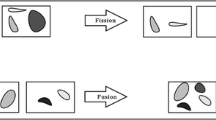Abstract
Mathematical models are useful in different fields to provide a deeper and more insightful understanding of various systems and notions. We refer here to the formal description of mobility in computer science. The first formalism in computer science able to describe mobility is the π-calculus [16]. It was followed by ambient calculus [6]. A biologically-inspired version of ambient calculus is given by bioambients [19] and several brane calculi [5]. On the other hand, systems of mobile membranes [13] represent other formalisms with mobility in the framework of membrane computing.
Access this chapter
Tax calculation will be finalised at checkout
Purchases are for personal use only
Preview
Unable to display preview. Download preview PDF.
Similar content being viewed by others
References
Aman, B., Ciobanu, G.: Timed Mobile Ambients for Network Protocols. In: Suzuki, K., Higashino, T., Yasumoto, K., El-Fakih, K. (eds.) FORTE 2008. LNCS, vol. 5048, pp. 234–250. Springer, Heidelberg (2008)
Aman, B., Ciobanu, G.: On the Relationship Between Membranes and Ambients. Biosystems 91, 515–530 (2008)
Aman, B., Ciobanu, G.: Simple, Enhanced and Mutual Mobile Membranes. In: Priami, C., Back, R.-J., Petre, I. (eds.) Transactions on Computational Systems Biology XI. LNCS(LNBI), vol. 5750, pp. 26–44. Springer, Heidelberg (2009)
Aman, B., Ciobanu, G.: Turing Completeness Using Three Mobile Membranes. In: Calude, C.S., Costa, J.F., Dershowitz, N., Freire, E., Rozenberg, G. (eds.) UC 2009. LNCS, vol. 5715, pp. 42–55. Springer, Heidelberg (2009)
Cardelli, L.: Brane calculi. In: Danos, V., Schachter, V. (eds.) CMSB 2004. LNCS (LNBI), vol. 3082, pp. 257–278. Springer, Heidelberg (2005)
Cardelli, L., Gordon, A.: Mobile Ambients. In: Nivat, M. (ed.) FOSSACS 1998. LNCS, vol. 1378, pp. 140–155. Springer, Heidelberg (1998)
Ciobanu, G., Krishna, S.N.: Enhanced Mobile Membranes: Computability Results. Theory of Computing Systems (to appear, 2011)
Ciobanu, G., Prisacariu, C.: Timers for Distributed Systems. Electronic Notes in Theoretical Computer Science 164, 81–99 (2006)
Ciobanu, G., Rotaru, M.: Molecular Interaction. Theoretical Computer Science 289, 801–827 (2002)
Ciobanu, G., Zakharov, V.: Encoding Mobile Ambients into π-calculus. In: Virbitskaite, I., Voronkov, A. (eds.) PSI 2006. LNCS, vol. 4378, pp. 148–161. Springer, Heidelberg (2007)
Hennessy, M.: A Distributed π-calculus. Cambridge University Press, Cambridge (2007)
Krishna, S.N.: Universality Results for P Systems Based on Brane Calculi Operations. Theoretical Computer Science 371, 83–105 (2007)
Krishna, S.N., Păun, G.: P Systems with Mobile Membranes. Natural Computing 4, 255–274 (2005)
Levi, F., Sangiorgi, D.: Mobile Safe Ambients. ACM TOPLAS 25, 1–69 (2003)
Milner, R.: Elements of Interaction. Turing Award Lecture. ACM Comm. 36, 78–89 (1993)
Milner, R.: Communicating and Mobile Systems: the π-calculus. Cambridge University Press, Cambridge (1999)
Păun, G.: Membrane Computing. An Introduction. Springer, Heidelberg (2002)
Păun, G., Rozenberg, A., Salomaa, A.: Handbook of Membrane Computing. Oxford University Press, Oxford (2010)
Regev, A., Panina, E.M., Silverman, W., Cardelli, L., Shapiro, E.: BioAmbients: An Abstraction for Biological Compartments. Theoretical Computer Science 325, 141–167 (2004)
Regev, A., Shapiro, E.: The π-calculus as an Abstraction for Biomolecular Systems. In: Ciobanu, G., Rozenberg, G. (eds.) Modelling in Molecular Biology. Natural Computing Series. Springer, Heidelberg (2004)
Victor, B., Moller, F.: The Mobility Workbench – A Tool for the π-calculus. In: Dill, D.L. (ed.) CAV 1994. LNCS, vol. 818, pp. 428–440. Springer, Heidelberg (1994)
Author information
Authors and Affiliations
Editor information
Editors and Affiliations
Rights and permissions
Copyright information
© 2010 Springer-Verlag Berlin Heidelberg
About this paper
Cite this paper
Ciobanu, G. (2010). Mobility in Computer Science and in Membrane Systems. In: Gheorghe, M., Hinze, T., Păun, G., Rozenberg, G., Salomaa, A. (eds) Membrane Computing. CMC 2010. Lecture Notes in Computer Science, vol 6501. Springer, Berlin, Heidelberg. https://doi.org/10.1007/978-3-642-18123-8_3
Download citation
DOI: https://doi.org/10.1007/978-3-642-18123-8_3
Publisher Name: Springer, Berlin, Heidelberg
Print ISBN: 978-3-642-18122-1
Online ISBN: 978-3-642-18123-8
eBook Packages: Computer ScienceComputer Science (R0)




